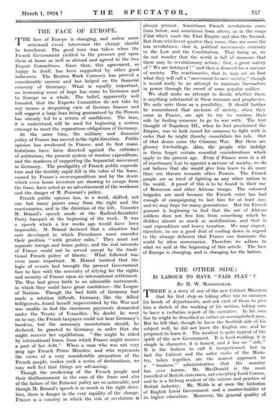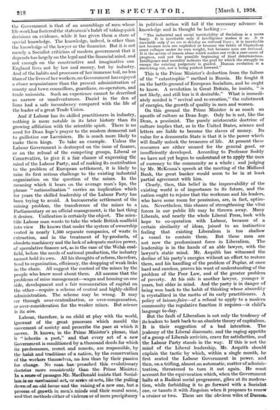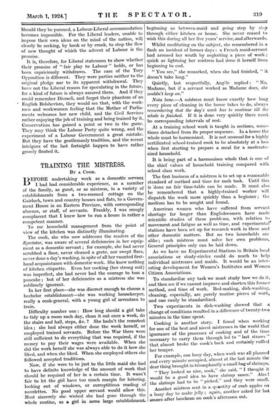THE OTHER SIDE:
THERE is a story of one of the new Cabinet Ministers that his first step on taking office was to summon his heads of departments, and ask each of them to give him a sketch of the working of his section, taking care to have a verbatim report of the narrative. In his own line he might be described as rather an accomplished man. But he felt that, though he knew the Scottish side of his subject well, he did not know the English one, and he proposed to learn it. The incident is quite typical of the spirit of the new Government. It is hard-working, it is simple in character, it is honest, and it has no " side." It is the fashion to call it inexperienced, but in fact the Cabinet and the outer ranks of the Minis- try, taken together, are the nearest approach to a " business " administration that the country has ever known. Mr. MacDonald is the most THERE is a story of one of the new Cabinet Ministers that his first step on taking office was to summon his heads of departments, and ask each of them to give him a sketch of the working of his section, taking care to have a verbatim report of the narrative. In his own line he might be described as rather an accomplished man. But he felt that, though he knew the Scottish side of his subject well, he did not know the English one, and he proposed to learn it. The incident is quite typical of the spirit of the new Government. It is hard-working, it is simple in character, it is honest, and it has no " side." It is the fashion to call it inexperienced, but in fact the Cabinet and the outer ranks of the Minis- try, taken together, are the nearest approach to a " business " administration that the country has ever known. Mr. MacDonald is the most travelled of British statesmen, not excepting Lord Curzon, and he is a lifelong student of the science and practice of British industry. Mr. Webb is at once the historian of English Local Government and a master-builder of its higher education. Moreover, the general quality of the Government is that of an assemblage of men whose life-w ork has fostered the statesman's habit of taking quick decisions on evidence, while it has given them a store of special knowledge. The knowledge, indeed, is other than the knowledge of the lawyer or the financier. But it is not merely a Socialist criticism of modern government that it depends too largely on the legal and the financial mind, and not enough on the constructive and imaginative one. England lives not by law and money, but by industry. And of the habits and processes of her immense toil, no less than of the lives of her workers, no Government has enjoyed a closer acquaintance than the present administration of county and town councillors, guardians, co-operators, and trade unionists. Such an experience cannot be described as narrow or unadventurous. Daniel in the den of lions had a safe incumbency compared with the life of the leader of a great Trade Union.
And if Labour has its skilled practitioners in industry, nothing is more notable in its later history than its growing affiliation with the scientific spirit. There is no need for Dean Inge's prayer to the modern democrat not to guillotine our Lavoisiers. He is much more likely to make them kings. To take an example. Unless the Labour Government is destroyed on the issue of finance, or on the refusal of the competing groups, Liberal or Conservative, to give it a fair chance of expressing the mind of the Labour Party, and of making its contribution to the problem of European settlement, it is likely to raise its first serious challenge to the existing industrial organization on the question of the mines. In the meaning which it bears on the average man's lips, the phrase " nationalization " carries an implication which for years the skilled, leadership of the Labour Party has been trying to avoid. A bureaucratic settlement of the mining problem, the transference of the mines to a Parliamentary or an official management, is the last thing it desires. Unification is certainly the object. The scien- tific Labour man wants to take the whole British coalfield into view He knows that under the system of ownership vested in nearly 1,500 separate companies, of waste in extraction, and in the treatment of by-products, of obsolete machinery and the lack of adequate motive power, of speculative finance set, as in the case of the Welsh coal- field, before the needs of national production, the industry cannot hold its own. All his thoughts of reform, therefore, tend to organization, efficiency, the dropping of weak links in the chain. All suggest the control of the mines by the people who know most about them. All assume that the problems of mine management—wages and housing on one side, development and a fair remuneration of capital on the other—require a scheme of central and highly-skilled administration. The scheme may be wrong. It may err through over-centralization, or over-compensation, or over-consideration for the weaker mines. But science is its aim.
Labour, therefore, is no child at play with the world, ignorant of the great processes which mould the movement of society and prescribe the pace at which it moves. It knows,• in the Prime Minister's phrase, that it " inherits a past," and, that every act of a new Government is.conditioned. by athousand deeds far which its predecessors, recent and remote, are responsible, by the habit and traditions of a nation, by the conservatism of the workers themselves,; no less, than by their passion for change. No man• has f preached this evolutionary doctrine mare consistently than the. Prime Minister. Ia ascore-of pas.sageaMr: MacDonald insists that Social- ismiia no msehanicial,act; or series of, acts, like•the pulling downtof aniold,house feud the raisinikof a new one, but a process of growth- in metes. minds and, their moral sense, and that methods either of violence or of mere precipitancy in political action will fail if the necessary advance in knowledge and in thought be lacking :-- " The industrial and social inevitability of Socialism is a mere fancy. It is inevitable only if intelligence makes it so. It is inevitable only if we are to develop on rational lines ; it is inevitable not because men are exploited or because the fabric of Capitalism must collapse under its own weight, but because men are rational. It is the action of reason alone which makes our evils a sure cause of progress, and not the possible beginning of final deterioration. Intelligence and morality indicate the goal by which the struggle to escape the existing purgatory is guided. Human evolution is a stretching out, not a being pushed forward."
This is the Prime Minister's deduction from the failure of the " catastrophic " method in Russia. He fought it on the battle-ground of European Socialism, and he ought to know. A revolution in Great Britain, he insists, " is not likely, and still less is it desirable." What is immedi- ately needed is " revival and re-creation," the enlistment of energies, the growth of quality in men and women.
On this ground the Prime Minister is as much an apostle of culture as Dean Inge. Only he is not, like the Dean, a pessimist. The purely aristocratic doctrine of culture implies that, as in the United States, science and letters are liable to become the slaves of money. Its value for a democratic State is that it is the power which will finally unlock the treasures of life. At present these resources are either unused for the general good, or insufficiently developed. According to Professor Soddy we have not yet begun to understand or to apply the uses of currency to the community as a whole ; and judging by Mr. McKenna's speech at the meeting of the Midland Bank, the great banker would seem to be in at least partial agreement with him.
Clearly, then, this belief in the improvability of the existing world is of importance to its future, and the nation ought to rejoice that the workman and his leaders, who have some room for pessimism, are, in fact, optim- ists. Nevertheless, this chance of strengthening the vital forces in our public life may be thrown away. Many Liberals, and nearly the whole Liberal Press, look with hope to co-operation with Labour, because of a certain similarity of ideas, joined to an instinctive feeling that existing Liberalism is too shallow a vessel to contain them. But these men are not now the predominant force in Liberalism. The leadership is in the hands of an able lawyer, with the lawyer's static mind. Mr. Asquith has witnessed the decline of his party's energies without an effort to restore them, and his handling of the problem of Poplar, at once hard and careless, proves his want of understanding of the problem of the Poor Law, and of the greater problem of poverty. At his side is another lawyer, younger it years, but older in mind. And the party is in danger of being won back to the habit of thinking whose absurdity is crystallized in the motto of its early practitioners. A policy of laissez-faire—of a refusal to apply to a modern community the regulative function it requires—is child's language to-day.
But the fault of Liberalism is not only the tendency of its leaders to hark back to an obsolete theory of capitalism. It is their suggestion of a bad intention. The jealousy of the Liberal diaconate, and the raging appetite of a group of Liberals arrivists, crave for satisfaction, and the Labour Party stands in the way. If 'this is -not the mind of the Liberal leadership, Mr. Asquith should explain the tactic 'by which, within a single month, he first seated the Labour Government in power, and then, on a trifling, almost an automatic, matter of adminis- tration, threatened to turn it out again. He must account for the equivocation which, when the Government halts at a Radical social programme, gibes at its modera- tion, while forbidding it to go forward with a Socialist one, or taunts it with- Jingoism when it proposes to renew a cruiser or two. These are the obvious wiles of Duessaa Should they be pursued, a Labour-Liberal accommodation becomes impossible. For the Liberal leaders, unable to impose their own ideas on the mind of the nation, will clearly be seeking, by hook or by crook, to stop the flow of new thought of which the advent of Labour is the promise.
It is, therefore, for Liberal statesmen to show whether their promise of " fair play to Labour " holds, or has been capriciously withdrawn. The case of the Tory Opposition is different. They were parties neither to the original pledge nor to its apparent withdrawal. They have not the Liberal reason for speculating in the future, for a kind of future is always assured them. And if they could remember Disraeli, and forget their phantom of an English Bolshevism, they would see that, with the work- men and workwomen feeling that the Mother of Parlia- ments welcomes her new child, and the Civil Services rather enjoying the job of training and being trained by it, Conservatism -has gained a point or two in the game. They may think the Labour Party quite wrong, and the experiment of a Labour Government a great mistake. But they have the gentlemanly tradition, and the recent intrigues of the last fortnight happen to have rather grossly flouted it.












































 Previous page
Previous page